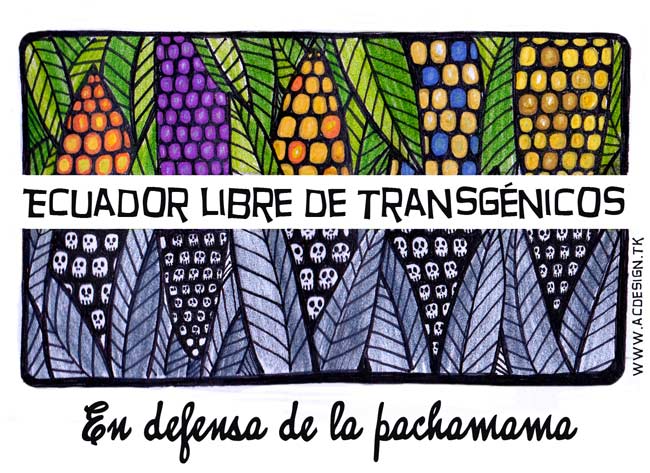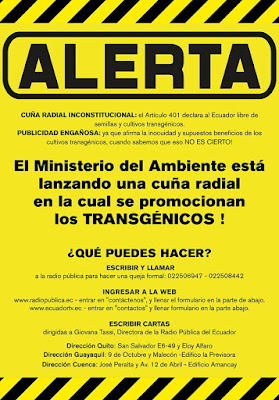By: Richard Intriago Barreno
FECAOL – ECOLOGICAL ACTION
Authorized Crops
In Ecuador we could say that there is a very encouraging current situation, with key legislative advances, with strong arguments in favor of agrobiodiversity and with a growing critical mass regarding the impacts that the introduction of genetically modified crops would generate in the country. However, many of the main spokespersons of the national government, especially the president of the republic, have permanently expressed their intention to allow and promote the entry of these crops, which is a clear attack on the majority decision of the Ecuadorian people contemplated in the Constitution of the Republic approved in 2008.
In this context, it is worth analyzing the Wikileaks cables dated 2009, which state that: “The Office (US Embassy) is requesting funding to support the travel of five Ecuadorian journalists to the United States to participate in a one-week biotechnology (GM) tour. The purpose of the tour is to educate opinion makers about biotechnology…. in line with the US Government’s position on biotechnology.” It adds that “Since Ecuador is a commercial market for these products (in 2008, the United States exported more than US$$33 million in soy flour and more than US$$44 million in coarse grains to Ecuador), it is in the interest of the US Government to obtain public support for biotechnology (GM). Coverage by respected Ecuadorian media in favor of GM will help change public opinion…. "It will lay the groundwork for positive opinion and help prevent public protests if the President or the National Assembly allows the approval and implementation of GMOs."
The cable also adds: “The presidential exception contemplated in the Constitution (art. 401) was added only as a result of lobbying by Ecuador’s influential agribusinesses…. It is to be expected that the National Assembly will approve legislation affecting biotechnology, the use and commercialization of transgenic seeds, and issues regarding consumer protection with respect to transgenic crops.”
In Ecuador, land concentration occurs most severely in the coastal region, where the largest producers of soybeans and corn are located, which is why it is understood
that the interest in the introduction of transgenic crops is directed towards this specific region, however no release of genetically modified crops has been authorized to date.
Illegal Introductions
There is also no known illegal introduction of transgenic crops into the country. For this reason, Acción Ecológica began monitoring corn and concluded that during the participatory monitoring process, carried out during the planting period of 2012 and 2013, no transgenic protein was detected, after having evaluated more than 400 corn samples. This leads us to propose that Ecuador is free of transgenic corn (Bravo and León, 2013).
Research and Biotechnology Centers
There are several research and biotechnology centres in the country, but only one of them, the Escuela Politécnica del Litoral (ESPOL), is developing a type of genetic modification to control black Sigatoka in banana crops, under the name of cisgenic banana. To do this, they combine the genes of two banana varieties in order to make them more resistant (El Telégrafo, 2012).
The authorization for this experiment was granted by the Secretary General of the Nation, who stated that there is no constitutional impediment to research into genetically modified organisms in the country.
Regulations
Among the legal norms that exist in the country, the most important is the Constitution of the Republic of Ecuador, which in its article 401 mentions: Ecuador is declared free of transgenic crops and seeds. Exceptionally, and only in case of national interest duly substantiated by the Presidency of the Republic and approved by the National Assembly, genetically modified seeds and crops may be introduced. The State will regulate under strict biosecurity norms, the use and development of modern biotechnology and its products, as well as its experimentation, use and commercialization. The application of risky or experimental biotechnologies is prohibited. In addition, there are other articles where the country is exclusively protected from any risk that threatens national biodiversity.
Likewise, there is the Organic Law of the Food Sovereignty Regime (LORSA)
Published in 2009 and modified in 2010, where paragraph 2 of article 26
mentions; “Raw materials containing inputs of transgenic origin
They may only be imported and processed, provided that they comply with the health and safety requirements, and that their reproductive capacity is disabled, respecting the precautionary principle, so that they do not threaten human health, food sovereignty and ecosystems. The products produced based on transgenics will be labeled according to the law that regulates the defense of consumer".
In addition, the Proposal for a Law on Agrobiodiversity, Seeds and Agroecological Promotion was drawn up, in which dozens of peasant organizations from all over the country participated, managing to create the legal tools to penalize those who introduce,
commercialize or cultivate transgenic crops in the national territory. This proposal passed the first debate in the National Assembly and is awaiting the continuation of the legislative process.
Ecuador is a member of the Biosecurity Protocol, but the role played by the delegate of the Ministry of the Environment is contrary to what is established in the Constitution of the Republic, to the Ecuadorian reality and to the interests of a megadiverse country.
Relevant Actors in the Country
Many of these advances in legislation and the promotion of sectors with capacity
of criticism and response to the economic power of agribusiness, has led it
Ecological Action, having as its main promoter and national reference against the
genetically modified organisms to Dr. Elizabeth Bravo.
Likewise, there are other civil society organizations from different parts of the
country that has taken this issue very seriously among its struggle objectives.
Among them we have the Federation of Agricultural Centers and Peasant Organizations
del Litoral (FECAOL), the Agroecological Collective of Ecuador, and some of the
national peasant and indigenous organizations. Other actors from different
sectors have also contributed to the resistance against GMOs, such as Roberto
Gortaire (Agroecological Collective of Ecuador), Fausto Falconí (Organic floriculturist),
Pedro Páez (Superintendent of market power control), among other actors of
civil society and several members of the public service.
Genetically modified foods
Participatory monitoring was carried out during 2013 to determine whether There is Roundup Ready transgenic protein in soybeans intended for consumption human. 89 samples were evaluated in 7 provinces of the country, 19 of which were found with genetically modified soy. This is understandable because the large imports of soybeans and corn produced by the balanced feed industries are materials genetically modified, it is also suspected that all the by-products that contain soy or corn and come from the USA, Argentina or Brazil, are made from genetically modified crops. With this argument, on September 11, In 2013, the Superintendency of Market Power Control issued the regulation technique 001, which establishes that all food and drink that companies produce or marketed in Ecuador must include a label stating whether or not it contains transgenic components, giving a specific period for compliance with the rule.
National Campaigns
Over the last few years, several initiatives and campaigns against GMOs have been carried out in Ecuador, some of them with a clear message such as “Ecuador, a Transgenic-Free Territory”, and others promoting agroecology, the recovery of native seeds and the consumption of healthy foods. These campaigns have been generated as a mobilizing strategy to combat transgenic crops and the use of pesticides in food. One of the campaigns carried out during this period
It is “How Delicious It Is… Eating Healthy and from My Country”, coordinated by the National Consumer Commission. In addition, there have been several demonstrations in the cities of Quito, Guayaquil and Vilcabamba against the transnational Monsanto, and as a measure of political pressure, the most forceful march for food sovereignty and against GMOs was held on October 16, 2013 in the city of Guayaquil, where approximately 4,000 people attended with chants such as, “Transgenics are poison, they end life, the only way out is agroecology.”
Looking Ahead
The situation that is seen in the immediate future for Ecuador is not entirely
encouraging, although it is true that awareness on this issue is growing in the Organized and unorganized civil society, there have been permanent declarations of the president of the republic who without further arguments and in many cases totally wrong, he has mentioned his interest in allowing the entry of crops transgenic crops to Ecuador. If it were supported by a National Assembly with more than 80% of fellow believers who support a “code of ethics” that would force them to vote as a block, Under the thesis that the party of the current regime considers, the current constitutional lock and, therefore, the other laws that support Ecuador free of transgenic crops and seeds. If this were the case, the only thing left would be resistance from peoples, nationalities, and consumers for the right to healthy, free food and sustained for our future generations.
Literature
• Bravo, E. and X. León. 2013. Participatory monitoring of Ecuadorian corn to detect the
presence of transgenic proteins. La Granja. Vol. 17(1): 16-24. Available at: http://
www.academia.edu/5077740/MONITOREO_PARTICIPATIVO_DEL_MAIZ_ECUATORIANO_PARA_DETECTAR_LA_PRESENCIA_DE_PROTEINAS_TRANSGENICAS.
• Constitution of the Republic. 2008, art. 401.
• The Telegraph. September 24, 2012. Society section, page 22.
• Organic Law of the Food Sovereignty Regime.
• Wikileaks, 2009.
![]()


